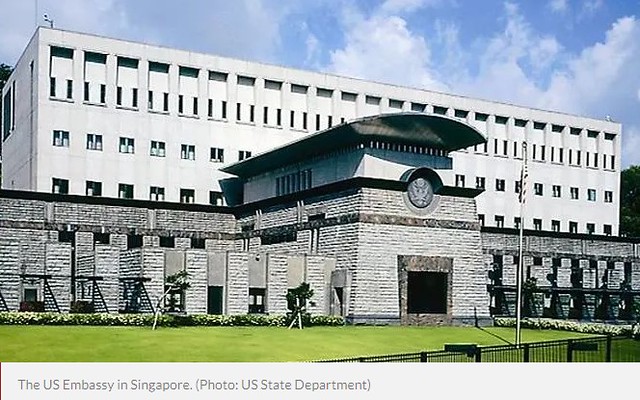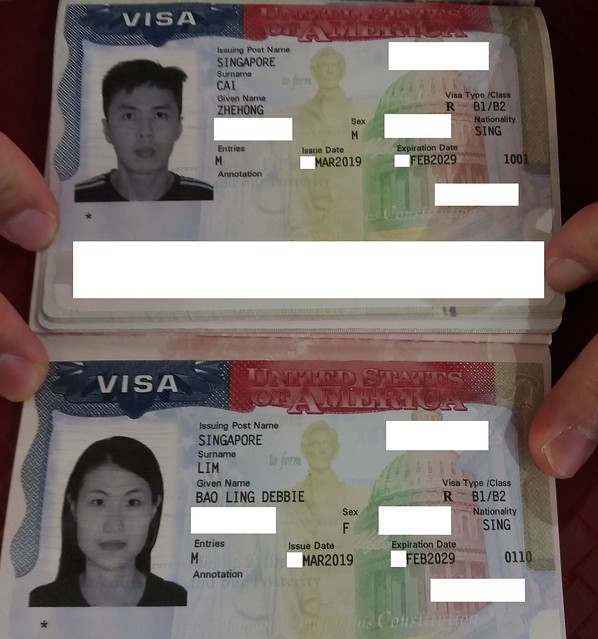27 February 2019, United States Embassy, Singapore. Written by Kelvin
We joined the snaking queue of 25 applicants who, to my surprise, were being interviewed openly at counters 4 to 6, much like a bank queue. I had expected visa interviews to be private and held in interview rooms, but perhaps the embassy's setup placed pressure on applicants to be brief and not to pour out their life’s story or plead with embassy officials for a visa approval. Nobody wanted to embarrass themselves, but this would be interesting. The 3 interviewing officers were seated behind glass barriers and applicants could hear them through a mic amplifying their voices. The whole queue could hear the interviews. People moved with decorum, putting on their best behavior in the well organised line. One nervous guy tripped over and murmured apologetically.
Most applicants before us were passport holders from China or India. A student from a polytechnic was attending an exchange program with her classmates and in 30 seconds, was on her way out after submitting a letter of invitation. A medical student was pursuing a doctorate program with Yale. One Indian guy had a Master’s degree from a university here and was attending a conference for 5 days.
Another well dressed lady was pressed which airport in California would she be landing in and had to be specific. “There is no California airport,” said the officer. “San Francisco,” she corrected herself.
“Your case will be pending,” said another officer in the adjacent counter to another applicant. "What is your purpose of travelling to the United States?" "Do you have supporting materials of your itinerary through Iran? "Do you have any other family members in the United States?" A tattooed guy was told, “As you have no new supporting materials since your previous rejected application, I’m afraid we cannot approve your visa.” The embassy officer had a crew cut and military bearing, a straight back and looked strict.
Yet another applicant was a mum from China who was travelling to visit. I was surprised the embassy officer conversed with her in fluent Chinese upon request. She looked nice but asked tough questions. “Who are you staying with? Do you have a point of contact in the United States?” The third embassy officer had rimmed glasses and looked most relaxed, like he belonged in a hostel perusing The Washington Post than visa applicants’ supporting documents. I liked him.
People’s hopes and dreams of travel to the United States were being approved efficiently or crushed professionally and politely before us, and within half an hour, our turn was up, to Mr Strict Officer’s counter.
“What is your purpose of travel to the United States?” asked Mr Strict Officer.
“We are travelling to Denver to buy 2 motorcycles to travel the world for 4 to 6 years,” I mustered.
“Years?” Brows raised, eyes perplexed, Mr Strict Officer scrutinised us.
“6 continents, and we are returning to the United States to discharge the Carnet De Passage at the end,” I offered, hoping to score a multiple-entry visa.
“What do you mean? 4 to 6 years? So you are buying a motorcycle in Denver?”
“2 motorcycles,” I corrected.
“And you are travelling to?” I knew we had Mr Strict Officer’s attention now, if not the room. We were two shabbily dressed chaps in dry fit T shirts and old pants who did not fit in the queue of young men with pressed long sleeved shirts and ladies in dresses and handbags slung off a shoulder, but we had broken the morning's routine.
“We are riding to Argentina first,” I offered. “Then we may ride to Alaska,” Debbie interjected. “Then we are going to Europe and Africa, and Asia and Australia,” I continued. Debbie glanced backwards and a guy in the queue had the same perplexed look on his face, but at this point I was focused on Mr Strict Officer.
“But you do not need a visa,” he questioned.
“We are flying in on 1 way tickets,” I responded.
“Have you applied for visas for South America? How are you bringing the motorcycles back to the United States? It is expensive?” I knew we were being probed on our story, and I could answer confidently. We had read too many ride reports on ADV forum.
“We don’t need visas for South America. Except the African ones. Air freight. Maybe 3 thousands dollars. Per vehicle, depending on distance.” I searched for answers, and found them.
“What is your income?” I was hoping to avoid this question as our declared income as freelance English tutors was not high. Trying to side-step the question, we presented our title deed and savings bonds and explained we were funding our trip with rent from our 3 bedroom public housing flat and savings, and had a flat to return to at the end. Mr Strict Officer nodded.
“And bank statements?” asked Mr Strict Officer, and we complied. He looked between us and a laptop screen and moments passed. We had showed our hand and had no more supporting materials to prove we were not going to be illegal job seekers in the United States. It had took us 10 years to get to this point. It was done now. The queue was probably listening to the other stories unfolding before them and more moments passed. I was beginning to be concerned. Debbie whispered, suggesting to show our travel blogs.
“Ok, your visa is approved. You can collect it in a week.” And just like that, we were done.
The border dance with immigration and customs had begun, and we were gently eased into the rhythm with a 10-year multiple entry visa.



